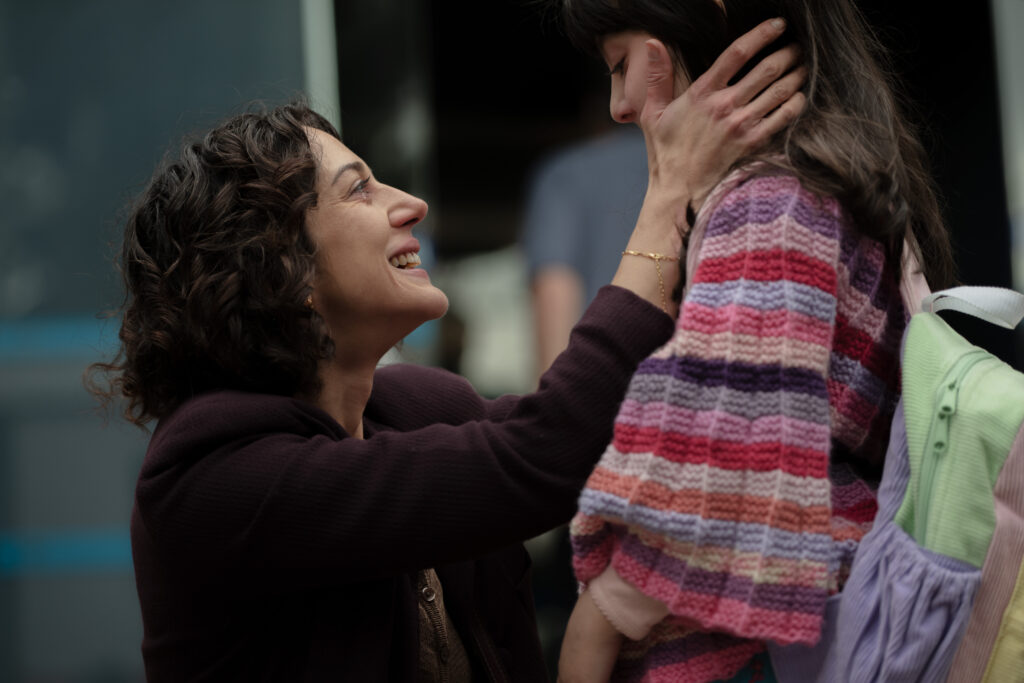Iranian Émigré Noora Niasari’s Debut Film Suggests Even Harsh Memories Can Be Blunted by the Passage of Time and the Exigencies of Art
Intimate, this kind of film is called.

As the final scene of “Shayda” faded to black and the credits began to roll, the audience with whom I attended the film gathered their jackets and began leaving the theater. Having misplaced my winter hat, I fumbled in the dark for a few moments only to see the screen light up again. Whereupon fiction turned to fact: vintage home movies started to play and, in them, figures who corresponded with those whose travails we had just witnessed. Could the small girl featured in them, I wondered, be the selfsame auteur who helmed the movie?
Noora Niasari is a 30-something Australian filmmaker whose roots are in Iran. “When I was 5 years old,” she writes in a statement accompanying the film, “my first experience of freedom was inside an Australian women’s shelter, living alongside other women and children seeking a life without fear.” Ms. Niasari then takes note of recent events in Iran. “The brave women and girls of Iran” are uppermost in her mind, as is the perilous journey that was taken by her mother.
Ms. Niasari’s debut feature, “Shayda,” is drawn from her own history as an Iranian emigre living in Australia. Awash in warm colors and set in soft focus, the picture suggests that memory, however harsh or discomfiting, can be blunted by the passage of time and the exigencies of art. Director of photography Sherwin Akbarzadeh is key, as is editor Elika Rezaee, both of whom endow the film with an informal, vérité-like grit. Intimate, this kind of film is called. Everyone associated with “Shayda” has brought it to realization with admirable understatement.

Ms. Niasari couldn’t have landed a better lead actress than Zar Amir Ebrahimi. You may remember Ms. Ebrahimi from last year’s “Holy Spider,” a film in which she not only starred but co-wrote the screenplay. The actress garnered huzzahs for her role as a reporter on the trail of a serial killer and won best actress nods from the Seville and Cannes Film Festivals. In “Shayda,” she plays the mother of Mona (Selina Zahednia), a 6-year old girl who is trying to find her bearings within the disintegration of her parents’ relationship.
When we first meet Shayda and Mona they’ve taken refuge at a women’s shelter in an unnamed Australian city. The shelter is overseen by a woman adamant on maintaining a safe harbor for her tenants, the tough-talking but kindly Joyce (Leah Purcell). We learn that Shayda and her husband Hosseim (Osamah Sami) came to Australia in order to further their education. Studying to become a doctor, Hosseim is intent on returning to Iran upon graduation. Shayda, in contrast, has had her scholarship pulled out from under her by the Islamic Republic. She’s not all that eager to return home. That, and Hosseim has become abusive.
Though Shayda has a group of supportive friends within the Iranian community, when word gets around that she’s seeking a divorce, she becomes something of an outcast. Traveling outside the shelter becomes an ordeal. Notwithstanding sunglasses and an obscuring shawl, Shayda is recognized at a local Persian supermarket. When Joyce is transcribing her testimony for the divorce proceedings, the Farsi translator on the speakerphone breaks free of the conversation and starts lecturing Shayda, by name, on the responsibilities of being a wife and mother. An understandable degree of paranoia is fostered.
Ms. Niasari has crafted a deliberate film whose trajectory, though conventional in its dramatic arcs, benefits from the specificities of culture. Even as Shayda begins to enjoy the freedoms offered by living in a Western society — abandoning the hijab, for instance, or dancing at a discotheque — she’s intent on developing a sense of Iranian identity for Mona, immersing her in the language, the holidays, the traditions, and food. There’s Nowruz, for instance, a festival that will likely be unknown to most Westerners and is pictured here to beneficent effect.
Would that Mr. Sami wasn’t saddled with a stock character — even a villain deserves some nuance — but the director has otherwise culled remarkable performances from one and all, especially Ms. Abrahimi. With her plaintive eyes and sharply contoured profile, she holds the screen with uncanny fortitude. The camera loves her, as will anyone who watches this deeply felt and unassuming film.

